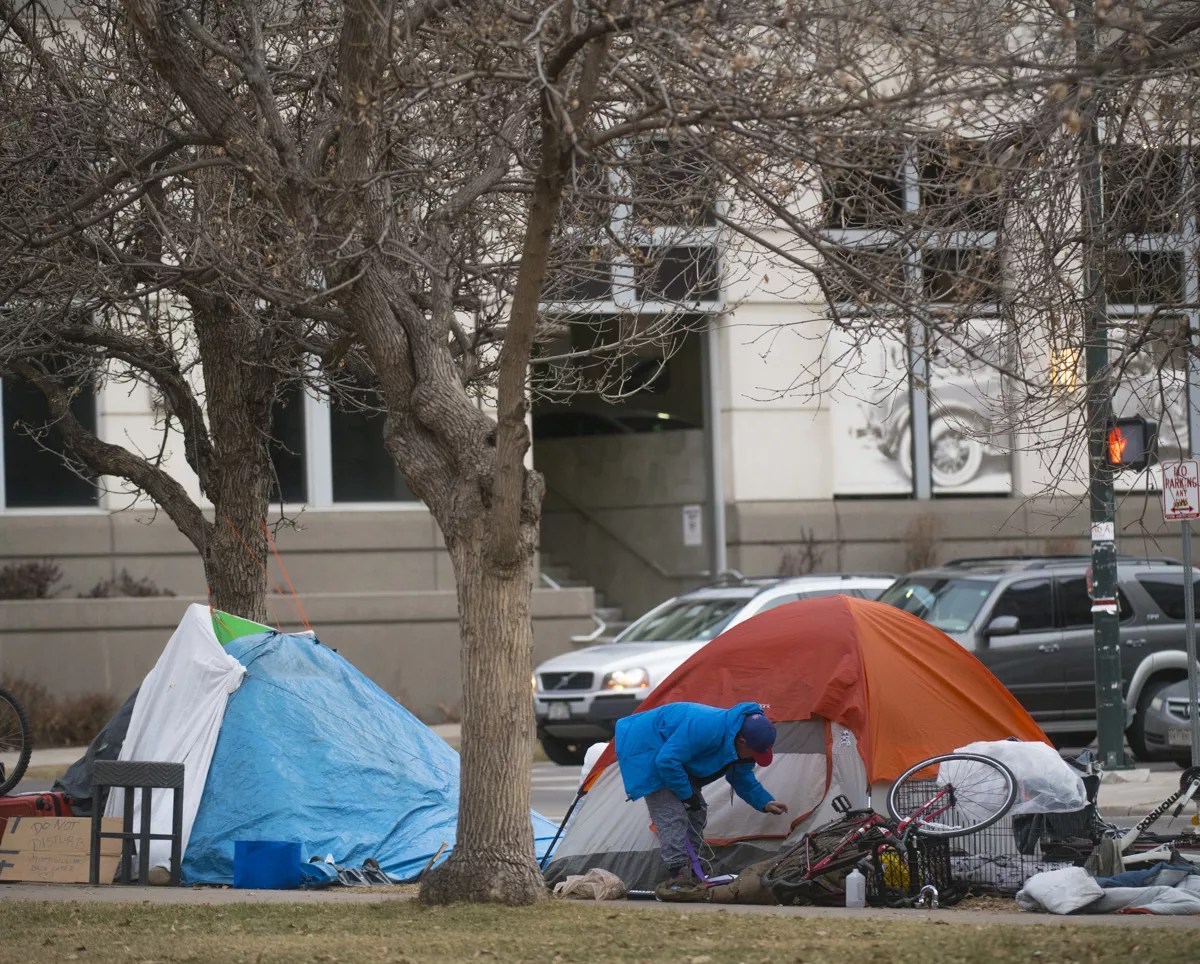
Evan Sem

Audio By Carbonatix
While proponents of an official safe-camping site haven’t yet been able to set up camp in the city, they want to show Denver residents what such a spot would look like.
“I think people don’t understand what we’re proposing. A lot of people think that we would sanction camping like it currently exists. What we’re trying to do is show how this is different,” says Cole Chandler, director of the Colorado Village Collaborative, one of the organizations working on the Safe Outdoor Spaces program that proposes to establish safe-camping sites in Denver.
This weekend, Chandler and others pushing the initiative will host an open house at a safe-camping site model in the parking lot of the Belong Church at East 16th Avenue and Ogden Street.
“It’s going to be a small site,” Chandler explains. “Just four tents. We’re setting it up to show what the spacing would look like and the amenities. We’ll have a fence surrounding it and a management station and tent. There will also be portable toilets, hand sinks, trash receptacles, bike racks and electric outlet options available.”
Setting up this model reflects a shift in approach for Safe Outdoor Spaces, putting the focus on education rather than the hunt for a location for a safe-camping site.
“We have felt like pinpointing specific areas isn’t helping,” notes Chandler.
Early on in the pandemic, as unofficial homeless encampments started popping up around the city and the Centers for Disease Control warned that displacing them could spread the coronavirus, Chandler and Kathleen Van Voorhis of the Interfaith Alliance of Colorado began pitching the idea of establishing staffed safe-camping sites. While the city had set up emergency shelters at the National Western Complex and the Denver Coliseum, these safe-camping sites would deal with the reality that many individuals had chosen to shelter outdoors, and would benefit from having a managed place to set up their tents, especially one with sink and toilet access.
A majority of Denver City Council, as well as the primary homeless service providers in the city, got behind the proposal. While initially opposed to the idea, Mayor Michael Hancock came around, announcing on July 1 that his administration would support the establishment of three safe-camping sites of up to sixty people each.
Soon the proposed location for the initial safe-camping site was revealed: the parking lot outside the Denver Coliseum.
Residents of the Globeville and Elyria-Swansea neighborhoods quickly rallied in opposition to the proposal, however, saying that the city had historically used that part of town as a dumping ground for services and projects that wouldn’t be accepted elsewhere. Safe Outdoor Spaces proponents scrapped that idea and began searching again.
After looking at close to 100 spots, they identified another site: a small plaza located between the Blair-Caldwell African American Research Library and Sonny Lawson Park in Five Points. This spot was close to a site proposed by members of Curtis Park Neighbors, who recognized that there were already dozens of homeless people living in tents in the area, and thought a safe-camping site could improve the situation.
But other members of the community, led by the Five Points Business Improvement District, began lobbying heavily against the proposed site, and in a matter of days, Hancock announced that he was withdrawing the Five Points location from consideration. “I encourage all of us to take some time to reflect on the difficulties of finding a suitable location for a use such as this,” he wrote on Facebook. “The need to serve our neighbors experiencing homelessness remains one of the most significant challenges we face today, and solutions will require broad understanding and collaboration.”
The Hancock administration had largely held off on major sweeps of encampments during the first months of the pandemic, but in August began sweeping encampments in Capitol Hill and Five Points, adding to the need for outdoor solutions.
Following Hancock’s announcement that the Five Points site was no longer in play, Safe Outdoor Spaces proponents started formulating a citywide effort to educate Denver residents on what safe-camping sites look like and why they’re needed.
“I think it’s going to be more important that we start to, as a community at large, rethink. We have to do something. Not doing anything is just not an option,” says Van Voorhis. “Everyone has to take a step back, get together, and talk about how to help our neighbors. We have to be able to provide services and support, because it’s not going away if we don’t.”
Today, September 30, Chandler and Van Voorhis are hosting a public webinar about safe-camping sites from 6 to 7:30 p.m. This weekend, the model site at 1615 Ogden Street will be open from 10 a.m. to 4 p.m. on Saturday, October 3, and noon to 4 p.m. on Sunday, October 4.
“Certainly, everybody is concerned and cares about where, but we also want to talk about what and how. This is a chance for people to interact with that,” says Britta Fisher, executive director of Denver’s Department of Housing Stability. “There will be a really concerted effort to talk about what a temporary managed campsite looks like before we bring forward sites.”
In mid-October, Denver City Council will vote on a request by the Hancock administration for a $650,000 allocation to help fund three safe-camping sites. Council could also soon consider a proposal to permit safe-camping sites in parts of Denver that still fall under the city’s old zoning code, which prohibits such facilities.